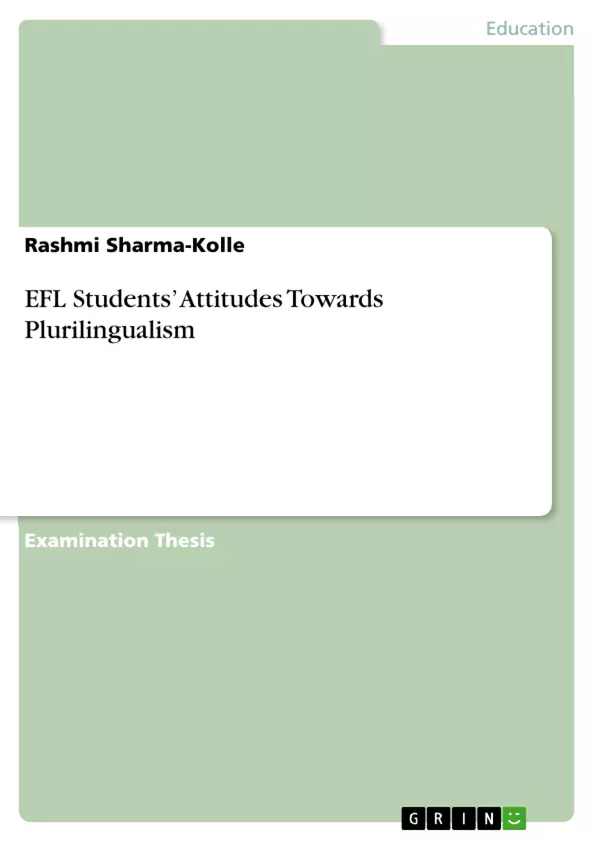This paper aims to gather evidence and improve existing knowledge about the factors that influence EFL students' attitudes towards plurilingualism as well as to investigate the extent to which EFL students' attitudes towards EFL learning foster or hinder plurilingualism.
An ideal way to investigate these questions would be through interviews, surveys or classroom observations. However, I believe that social science research should not be limited to primary data, especially during a pandemic when schools and children are overwhelmed by social distancing and the overuse of virtual learning. Therefore, in this paper, I examine existing empirical studies on language learning to answer the research questions.
EFL stands for English as a foreign language. This term is most commonly used for students whose first language is not English and who learn English while living in their home country. The term 'monolingual' in this paper refers to those who speak the language of their nation as their mother tongue. A bilingual person is someone who can speak two languages at a high level, and a multilingual person is someone who can communicate in more than two languages at a high level. ‘L1’ refers to one's mother tongue, and ‘L2’ is the language learned after the first language, generally after the mother tongue.
First, a brief overview of the transition of language education from monolingualism to plurilingualism is given. Then plurilingualism and attitudes are defined and discussed. After that, the traces of plurilingualism and attitude in foreign language teaching-learning practices in schools are then discussed. To this end, some empirical studies dealing with
pupils' attitudes towards plurilingualism will be presented and critically examined. This is followed by a conclusion that includes the limitations of the work and suggestions for future research.
Inhaltsverzeichnis (Table of Contents)
- Introduction
- Theoretical Background: Treading the Path
- Monolingualism to Translanguaging
- Plurilingualism and Foreign Language Education
- Attitude
- Attitudes of EFL Learners Towards Plurilingualism
- Identified Factors Influencing Students' Attitudes towards Plurilingualism
- To What Extent Do Attitudes of EFL Students Towards EFL Learning Help or Hinder Plurilingualism?
- Challenges to Plurilingualism
- Conclusion
- References
Zielsetzung und Themenschwerpunkte (Objectives and Key Themes)
The main objective of this work is to gain knowledge about EFL students' attitudes towards plurilingualism. The study aims to explore factors influencing these attitudes and analyze the extent to which students' views on English as a foreign language promote or challenge their perspective on plurilingualism.
- The development of foreign language education from monolingualism to multilingualism.
- The impact of factors such as individual experiences, language perceptions, family influence, media, and classroom interactions on students' attitudes towards plurilingualism.
- The role of language status in shaping attitudes towards plurilingualism, particularly the perception of less widespread languages.
- The potential of resource-oriented pedagogy in stimulating positive attitudes towards plurilingualism and mitigating language boundaries in the classroom.
- The importance of integrating linguistic diversity in the classroom and fostering a holistic approach to language learning.
Zusammenfassung der Kapitel (Chapter Summaries)
The introduction establishes the importance of language attitudes in language learning and discusses the impact of national education systems on students' perspectives. It highlights the shift towards multilingualism in German schools and the potential of diverse classrooms to cultivate positive attitudes towards plurilingualism.
The theoretical background delves into the evolution of language education from monolingualism to translanguaging, exploring the concepts of plurilingualism, language repertoire, and translanguaging within the framework of sociolinguistics and psycholinguistics.
The chapter on attitudes of EFL learners towards plurilingualism focuses on identifying factors influencing students' attitudes, examining the influence of EFL learning on their perspective on plurilingualism, and exploring the challenges associated with promoting plurilingualism in the classroom.
Schlüsselwörter (Keywords)
The primary keywords and focus topics of this work include language attitudes, language status, plurilingualism, and translanguaging. The study investigates the influence of these concepts on EFL students' perceptions and practices of plurilingualism.
Frequently Asked Questions
What does EFL stand for?
EFL stands for English as a Foreign Language. It refers to students learning English in their home country where English is not the primary language.
What is plurilingualism?
Plurilingualism is the ability of an individual to use more than two languages for communication at a high level, viewing their linguistic knowledge as a single, inter-connected repertoire.
What is translanguaging?
Translanguaging is a pedagogical approach and a linguistic practice where students use all of their language resources (mother tongue and learned languages) flexibly to learn and communicate.
What factors influence students' attitudes towards plurilingualism?
Attitudes are shaped by individual experiences, family influence, media, classroom interactions, and the perceived social status of specific languages.
Does learning English help or hinder plurilingualism?
While EFL learning can promote language awareness, the high status of English sometimes leads students to undervalue less widespread languages, which can challenge a holistic plurilingual perspective.
- Citation du texte
- Rashmi Sharma-Kolle (Auteur), EFL Students’ Attitudes Towards Plurilingualism, Munich, GRIN Verlag, https://www.grin.com/document/1212104



